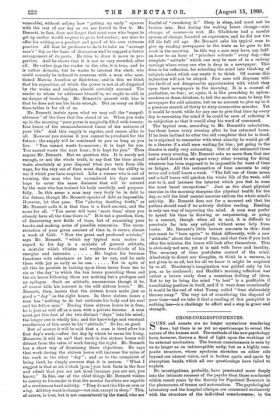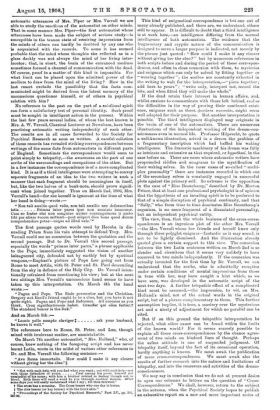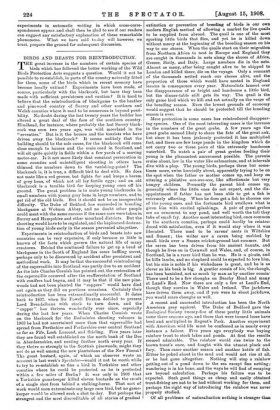CROSS-CORRESPONDENCES.
SUNS and comets are no longer mysterious wandering fires; but there is as yet no spectroscope to reveal the nature of the human soul. The methods of the new psychology have, however, thrown a flood of light upon the workings of its external mechanism. The human consciousness is seen by us no longer as an indiscerptible unity, but as a highly com- posite structure, whose spectrum stretches on either side beyond our utmost vision, and is broken again and again by absorption bands, which all our questionings have failed to explain.
No investigations, probably, have penetrated more deeply into the intimate recesses of the psyche than those conducted within recent years by the Society for Psychical Research in the phenomena of trance and automatism. The psychological laboratory and the hospital clinique are concerned exclusively with the structure of the individual consciousness; in the
automatic utterances of Mrs. Piper or Mrs. Verrall we are able to study the reactions of the automatist on other minds. That in some manner Mrs. Piper—the first automatist whose utterances have been made the subject of serious study—is susceptible in the trance state of receiving impressions from the minds of others can hardly be doubted by any one who is acquainted with the records. To some it has seemed probable that the mind whose thoughts she reflected as in a glass darkly was not always the mind of her living inter- locutor; that, in short, the brain of the entranced medium sometimes formed a channel of communication with the dead. Of course, proof in a matter of this kind is impossible. For what limit can be placed upon the admitted power of the medium to draw from the mind of the living ? How in the last resort exclude the possibility that the facts com- municated might be derived from the latent memory of the unconscious questioner himself, or of others in psychical relation with him ?
No reference to the past on the part of a soi-disant spirit can form a satisfactory test of personal identity. Such proof must be sought in intelligent action in the present. Within the last few years several ladies, of whom the best known is Mrs. A. W. Verrall, Classical Lecturer at Newnhain, have been practising automatic writing independently of each other.
The results are in all cases forwarded to the Society for Psychical Research as soon as written. A careful collation of these records has revealed striking correspondences between writings of the same date from automatists in different parts of England. Sometimes the correspondence would seent to point simply to telepathy,—the awareness on the part of one scribe of the surroundings and occupations of the other. But in a few instances the correspondence is of a more complicated kind. It is as if a third intelligence were attempting to convey separate fragments of an idea to the two writers in such a manner that each fragment should be meaningless in itself, but, like the two halves of a bank-note, should prove signifi- cant when joined together. Thus on March 2nd, 1906, Mrs. Verrall's hand—for she herself is ignorant at the time of what her hand is doing—wrote :— "Non tali auxilio quod veils, non tali auxilio nee defensoribus
istis Primus inter pares ipse non nomiuis immemor. Cum so frater etsi non sanguine animo consanguineus ii ambo tibi per aliam vocem mittent—post aliquot dies bone quod dieam comprehendere potes—usque ad illud vale."*
The first passage quotes words used by Hecuba in dis- suading Priam from his vain attempt to defend Troy. Mrs.
Verrall could see no connexion between the quotation and the second passage. But to Dr. Verrall this second passage, especially the words" primus inter pares," a phrase applicable to the Pope, immediately suggested the vision of another beleaguered city, defended not by earthly but by spiritual weapons,—Raphael's picture of Pope Leo going out from Rome to meet Attila, with St. Peter and St. Paul descending from the sky in defence of the Holy City. Dr. Verrill' inten- tionally refrained from mentioning his view; but at the next two sittings Mrs. Verrall's unconscious hand seems to have taken up this interpretation. On March 4th the hand wrote :—
" Pagan and Pope. The Stoic persecutor and the Christian. Gregory not Basil's friend ought to be a clue, but you have it not quite right. Pagan and Pope and Reformer. All enemies as you think. Crux signifieationem habet. Crucifer qui olim fertur4 The standard bearer is the link."
And on March 5th :— "Leonis polio sumpto claviger: ask your husband, he knows it well."
The references here to Rome, St. Peter, and Leo, though mixed with irrelevant matter, are unmistakable.
On March 7th another automatist, "Mrs. Holland," who, of course, knew nothing of the foregoing script and has never learnt Latin, wrote in the midst of various other references to Dr. and Mrs. Verrall the following sentence :— "Ave Roma immortalis. How could I make it any clearer without giving her the clue."§
• ',Not with such help will you find what you want ; not with such help—nor with those defenders of yours First among his peers, himself not unmindful of his name ; with him a brother related in feeling though not in blood. Both these will send a word to you through another woman. Liter some days you will easily understand what I Bay; till then farewell."
t The cross has a meaning. The Cross bearer who one day is borne. The club bearer (or key bearer) with the lion's skin."
§ "Proceedings of the Society for Psychical Research," Part LV., pp. 295,
5$97-98.
This kind of enigmatical correspondence is but one out of many already published, and there are, we understand, others still to appear. It is difficult to doubt that a third intelligence is at work here,—an intelligence differing from the normal intelligence of both automatists. The evidence that the fragmentary and cryptic nature of the communication is designed to serve a larger purpose is indicated, not merely by the phrase just quoted: "How could I make it any clearer without giving her the clue F" but by numerous references in both scripts before and during the period of these correspon- dences, and often in close conuexion with them, to mysteries and enigmas which can only be solved by fitting together or " weaving together "; the scribes are constantly exhorted in the writing to wait for the interpretation,—" piece together ; add hers to yours" ; "write only, interpret not, record the bits, and when fitted they will make the whole."
If the dead retain their interest in human affairs, and, whilst anxious to communicate with those left behind, realise the difficulties in the way of proving their continued exist- ence, enigmas such as these, Ocoviiiera o-vscrolcri, might seem well adapted for their purpose. But another interpretation is possible. The third intelligence displayed may originate in the brain of one of the automatists. There are numerous illustrations of the independent working of the dream-con- sciousness even in normal life. Professor Hilprecht, to quote a well-known illustration, solved in a dream the problem of a fragmentary inscription which had baffled his waking intelligence. The dramatic machinery of his dream was fully as intricate and extensive as that required, ex hypothesi, in the case before us. There are cases where automatic writers have propounded riddles and anagrams to the mystification of their waking selves. In the rarer cases of so-called "multi- plex personality" there are instances recorded in which one of the secondary selves is constantly engaged in successful plots against the primary self. So extreme is the opposition in the case of "Miss Beauchamp," described by Dr. Morton Prince, that at least one professional psychologist is of opinion that the hypothesis of an invading spirit is to be preferred to that of a simple disruption of psychical continuity, and that "Sally," who from time to time dominates Miss Beauchamp's organism, is no mere fragment of a dissociated personality, but an independent psychical entity.
The view, then, that the whole business of the cross-corre- spondences is an ingenious plot of the other Mrs. Verrall —the Mrs. Verrall whom her friends and herself know only through these polyglot enigmas--fantastic as it may sound, is not to be lightly dismissed. And the illustration already quoted gives a certain support to this view. The connexion between the two Latin sentences written on March 2nd is so slender and circuitous that it seems very unlikely to have occurred to two minds independently. If the connexion was actually invented for the first time by Dr. Verrall, we can understand that the scribe, who is admittedly receptive under certain conditions of mental impressions from those in tune with her, may have caught a hint which, as we have seen, was developed in the automatic script of the next two days. A further telepathic effect of a complicated kind must be assumed,—the impression, to wit, on Mrs. Holland's mind, not of the actual words in the original script, but of a phrase complementary to them. This further assumption implies, it is true, a mastery over the mysterious art and a nicety of adjustment for which no parallel can be cited.
But if on this ground the telepathic interpretation be rejected, what other cause can be found within the limits of the known world ? For it seems scarcely possible to explain all these cross-correspondences by the chance agree- ment of two minds on kindred lines of thought. Perhaps the safest attitude is one of suspended judgment. Of telepathy itself, beyond the fact of its occasional operation, hardly anything is known. We must await the publication of more cross-correspondences. We must await also the results of further research into the nature and limitations of telepathy, and into the resources and activities of the dream- consciousness.
We may say in conclusion that we do not at present desire to open our columns to letters on the question of "Cross- Correspondences." We shall, however, return to the subject in the autumn, when the Psychical Society hopes to publish an exhaustive report on a new and more important series of
experiments in automatic writing in which cross-corre- spondences appear, and shall then be glad to see if our readers can suggest any satisfactory explanation of these remarkable phenomena. What we bare said to-day will however, we trust, prepare the ground for subsequent discussion.








































 Previous page
Previous page